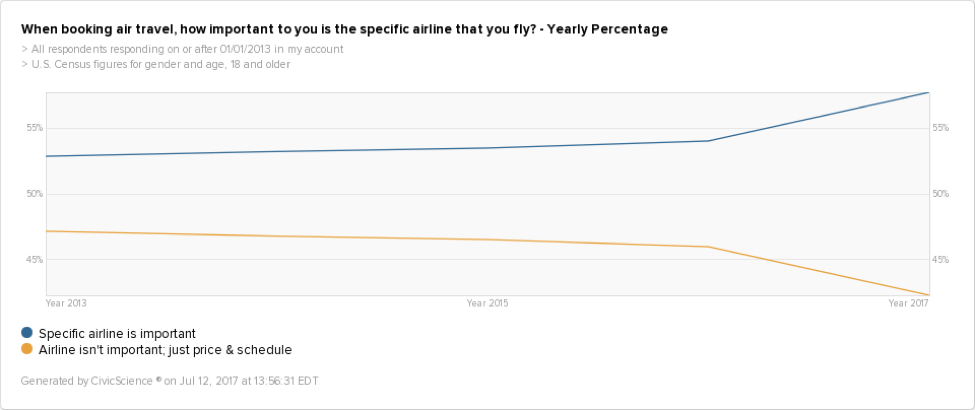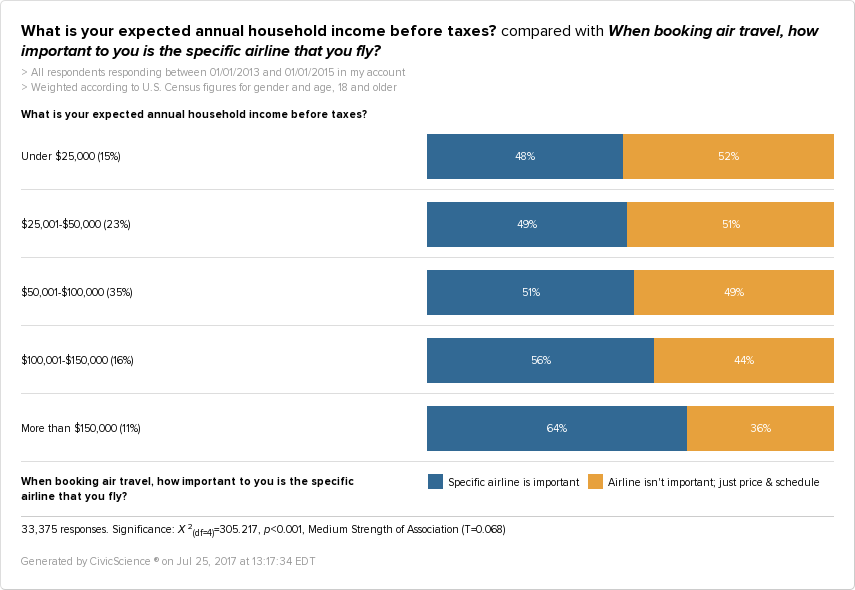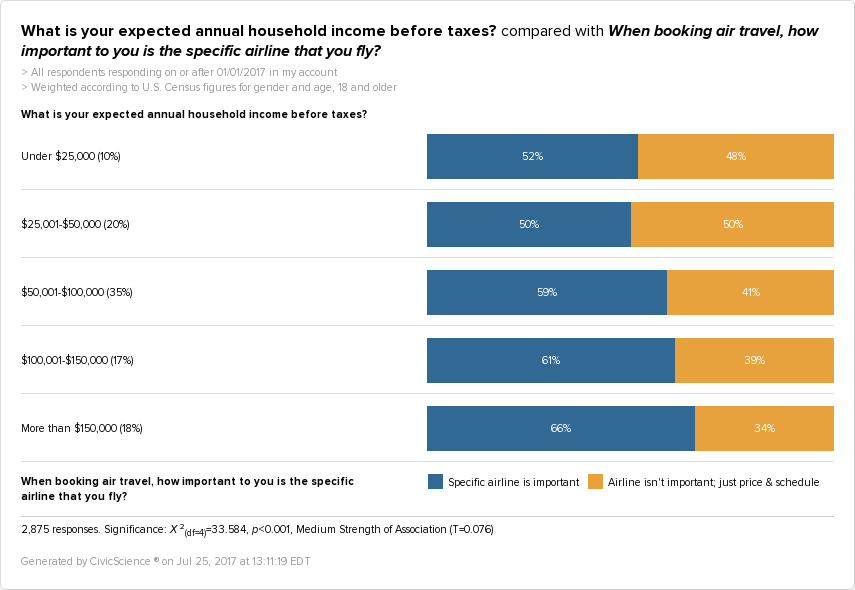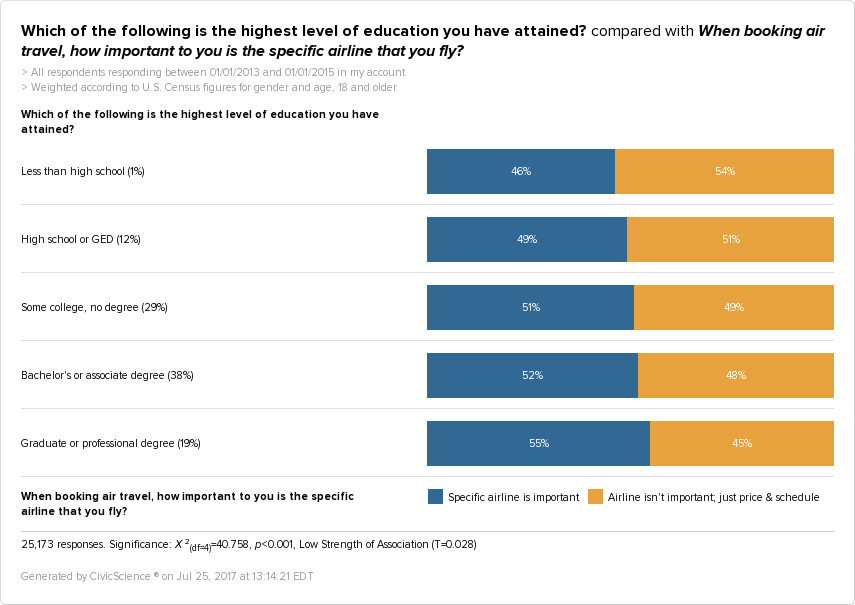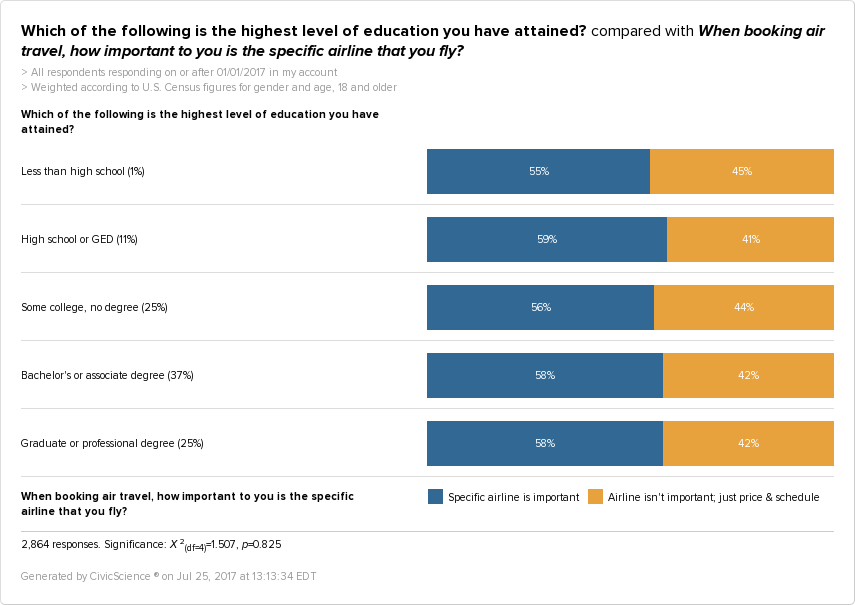The Gist: Since 2014, there’s been a 5% increase in consumers who feel that flying a specific airline is more important than price or schedule. We compared consumer opinions before 2015 and after 2017 on this topic. We found that consumers of all income and education levels are now more likely to say that a specific airline is more important than the price or schedule.
How does the saying go? “All press is good press?” Maybe not so much.
In combing through our data recently, we found something interesting, but not very surprising. Take a look at this:
While the disparity between those who value airline brand over price and schedule has been growing steadily by 1% every year since 2014, these numbers hiked by 5% after January 2017.
Background
It would be difficult to argue that this jump isn’t at least partly in response to the bad PR United Airlines has received this year. As a refresher, on April 9, 2017, security forcibly removed (or “re-accommodated”) Dr. David Dao from a United Airlines flight from Chicago, IL after he refused to give up his seat on an overbooked flight. Viral videos showed an unconscious Dr. Dao being dragged off the flight by security, which sparked public outrage. You can read more about the timeline of events here. After these events, 61% of consumers said they were less likely to fly United.
Additionally, on April 14, 2017 and again on May 12, 2017, passengers encountered scorpions on United Airlines flights. No one was stung in May, but one passenger was stung in April while removing the scorpion from his hair.
Brand Loyalty and the Modern Consumer
It’s no surprise that people are becoming more concerned about which airline they fly now that United Airlines has so dramatically put air travel in the news.
We’ve already noted that brand loyalty is in decline among Millennials, who have no problem abandoning a particular brand for the sake of change, and that 22% of consumers are ready to jump ship (or should I say jump plane) on a brand that doesn’t align with their own values. We’ve even posted about the rise in socially conscious consumers since the November 2016 election.
Knowing what we know about modern day consumers, we shouldn’t expect them to stick with an airline they don’t like just because the price or schedule is convenient.
Before 2015
After 2017
Before 2015, 53% of answered that specific airline is more important than price, compared to 58% in 2017. As already stated, a 5% hike.
So who, exactly, is paying more attention to what airline they fly?
Income and Airline Preference
I noticed that those who are most picky about the airline they fly are twice as likely to dine regularly at upscale restaurants, are more likely to earn 100K+ per year, and are less likely to prefer restaurants with lower prices.
So, I wondered if the preference of airline over price was strictly a privilege that comes with disposable income.
While that might have been the case before 2015, it’s absolutely not the case anymore.
Before 2015
Before 2015, the point that airline became more important than price was an income of $50K or more. Any less than that, and price was most important.
After 2017
Fast forward to 2017, and every income bracket believes that the airline is more important than the price, with the exception of those making between $25K and $50K annually, who are evenly split.
Those in the $50K-$100K annual income brackets showed the most change, with 59% in 2017 answering that airline is more important than the price, as opposed to 51% before 2015.
The $100K-$150K annual income group also showed a 5% increase since 2015 in those who prefer airline over price.
Shockingly, those making under $25K annually showed a 4% increase in preferring airline over price. In 2015, the majority said that price was more important by 52%. In 2017, the numbers flipped completely, with 52% answering that the specific airline is more important than price.
Education
Next, we looked at education and found that, in 2017, level of education doesn’t matter when it comes to airline brand over price.
Before 2015
After 2017
In 2015, only respondents with at least some college education showed a preference for airline over price. In 2017, all respondents, regardless of level of education, preferred airline over price.
The most shocking difference between these two graphs is the jump in airline preference for those without a college education. Before 2015, 49% of respondents with only a high school diploma or GED said that the airline is more important than the price, and 51% said that price is more important. This group was nearly an even split.
In 2017, however, they’ve made up their minds. Of the respondents with only a high school diploma or GED, 59% say that specific airline is more important than price. That’s a 10% hike!
But what does it all mean?
If United Airlines set out to prove that there is such a thing as bad publicity, then they’ve succeeded wonderfully.
While poor conditions, unhappy customer service personnel, hidden fees, increased luggage restrictions, and overbooked flights may have once been a necessary evil to bear while traveling by air, it appears consumers can be pushed too far.
Traveling through the sky is certainly faster than on land, so people probably won’t boycott the industry as a whole, but, we’ve shown many times that consumers know they can hit companies hardest by attacking their wallets.
With consumers of all classes and backgrounds becoming more picky about who they fly with, airlines will have to capture customer loyalty with customer service and guaranteed seating.
But then again, you can’t overbook flights if no one’s on them, right?
